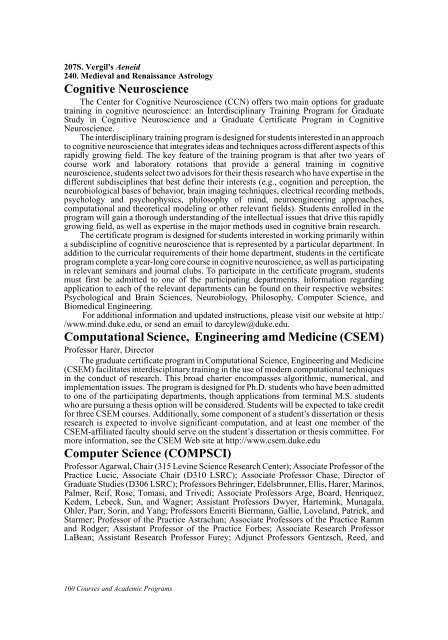2005-06 - Office of the Registrar - Duke University
2005-06 - Office of the Registrar - Duke University
2005-06 - Office of the Registrar - Duke University
Create successful ePaper yourself
Turn your PDF publications into a flip-book with our unique Google optimized e-Paper software.
207S. Vergil's Aeneid<br />
240. Medieval and Renaissance Astrology<br />
Cognitive Neuroscience<br />
The Center for Cognitive Neuroscience (CCN) <strong>of</strong>fers two main options for graduate<br />
training in cognitive neuroscience: an Interdisciplinary Training Program for Graduate<br />
Study in Cognitive Neuroscience and a Graduate Certificate Program in Cognitive<br />
Neuroscience.<br />
The interdisciplinary training program is designed for students interested in an approach<br />
to cognitive neuroscience that integrates ideas and techniques across different aspects <strong>of</strong> this<br />
rapidly growing field. The key feature <strong>of</strong> <strong>the</strong> training program is that after two years <strong>of</strong><br />
course work and laboratory rotations that provide a general training in cognitive<br />
neuroscience, students select two advisors for <strong>the</strong>ir <strong>the</strong>sis research who have expertise in <strong>the</strong><br />
different subdisciplines that best define <strong>the</strong>ir interests (e.g., cognition and perception, <strong>the</strong><br />
neurobiological bases <strong>of</strong> behavior, brain imaging techniques, electrical recording methods,<br />
psychology and psychophysics, philosophy <strong>of</strong> mind, neuroengineering approaches,<br />
computational and <strong>the</strong>oretical modeling or o<strong>the</strong>r relevant fields). Students enrolled in <strong>the</strong><br />
program will gain a thorough understanding <strong>of</strong> <strong>the</strong> intellectual issues that drive this rapidly<br />
growing field, as well as expertise in <strong>the</strong> major methods used in cognitive brain research.<br />
The certificate program is designed for students interested in working primarily within<br />
a subdiscipline <strong>of</strong> cognitive neuroscience that is represented by a particular department. In<br />
addition to <strong>the</strong> curricular requirements <strong>of</strong> <strong>the</strong>ir home department, students in <strong>the</strong> certificate<br />
program complete a year-long core course in cognitive neuroscience, as well as participating<br />
in relevant seminars and journal clubs. To participate in <strong>the</strong> certificate program, students<br />
must first be admitted to one <strong>of</strong> <strong>the</strong> participating departments. Information regarding<br />
application to each <strong>of</strong> <strong>the</strong> relevant departments can be found on <strong>the</strong>ir respective websites:<br />
Psychological and Brain Sciences, Neurobiology, Philosophy, Computer Science, and<br />
Biomedical Engineering.<br />
For additional information and updated instructions, please visit our website at http:/<br />
/www.mind.duke.edu, or send an email to darcylew@duke.edu.<br />
Computational Science, Engineering amd Medicine (CSEM)<br />
Pr<strong>of</strong>essor Harer, Director<br />
The graduate certificate program in Computational Science, Engineering and Medicine<br />
(CSEM) facilitates interdisciplinary training in <strong>the</strong> use <strong>of</strong> modern computational techniques<br />
in <strong>the</strong> conduct <strong>of</strong> research. This broad charter encompasses algorithmic, numerical, and<br />
implementation issues. The program is designed for Ph.D. students who have been admitted<br />
to one <strong>of</strong> <strong>the</strong> participating departments, though applications from terminal M.S. students<br />
who are pursuing a <strong>the</strong>sis option will be considered. Students will be expected to take credit<br />
for three CSEM courses. Additionally, some component <strong>of</strong> a student’s dissertation or <strong>the</strong>sis<br />
research is expected to involve significant computation, and at least one member <strong>of</strong> <strong>the</strong><br />
CSEM-affiliated faculty should serve on <strong>the</strong> student’s dissertation or <strong>the</strong>sis committee. For<br />
more information, see <strong>the</strong> CSEM Web site at http://www.csem.duke.edu<br />
Computer Science (COMPSCI)<br />
Pr<strong>of</strong>essor Agarwal, Chair (315 Levine Science Research Center); Associate Pr<strong>of</strong>essor <strong>of</strong> <strong>the</strong><br />
Practice Lucic, Associate Chair (D310 LSRC); Associate Pr<strong>of</strong>essor Chase, Director <strong>of</strong><br />
Graduate Studies (D3<strong>06</strong> LSRC); Pr<strong>of</strong>essors Behringer, Edelsbrunner, Ellis, Harer, Marinos,<br />
Palmer, Reif, Rose, Tomasi, and Trivedi; Associate Pr<strong>of</strong>essors Arge, Board, Henriquez,<br />
Kedem, Lebeck, Sun, and Wagner; Assistant Pr<strong>of</strong>essors Dwyer, Hartemink, Munagala,<br />
Ohler, Parr, Sorin, and Yang; Pr<strong>of</strong>essors Emeriti Biermann, Gallie, Loveland, Patrick, and<br />
Starmer; Pr<strong>of</strong>essor <strong>of</strong> <strong>the</strong> Practice Astrachan; Associate Pr<strong>of</strong>essors <strong>of</strong> <strong>the</strong> Practice Ramm<br />
and Rodger; Assistant Pr<strong>of</strong>essor <strong>of</strong> <strong>the</strong> Practice Forbes; Associate Research Pr<strong>of</strong>essor<br />
LaBean; Assistant Research Pr<strong>of</strong>essor Furey; Adjunct Pr<strong>of</strong>essors Gentzsch, Reed, and<br />
100 Courses and Academic Programs









